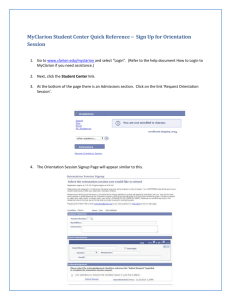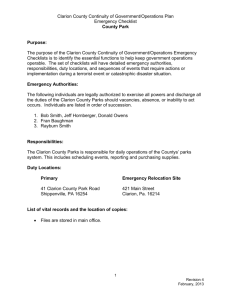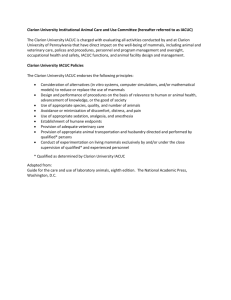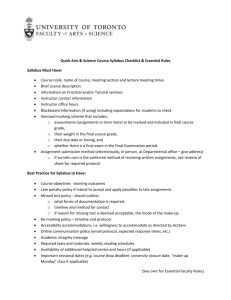Clarion University of Pennsylvania UNIVERSITY POLICY FOR
advertisement
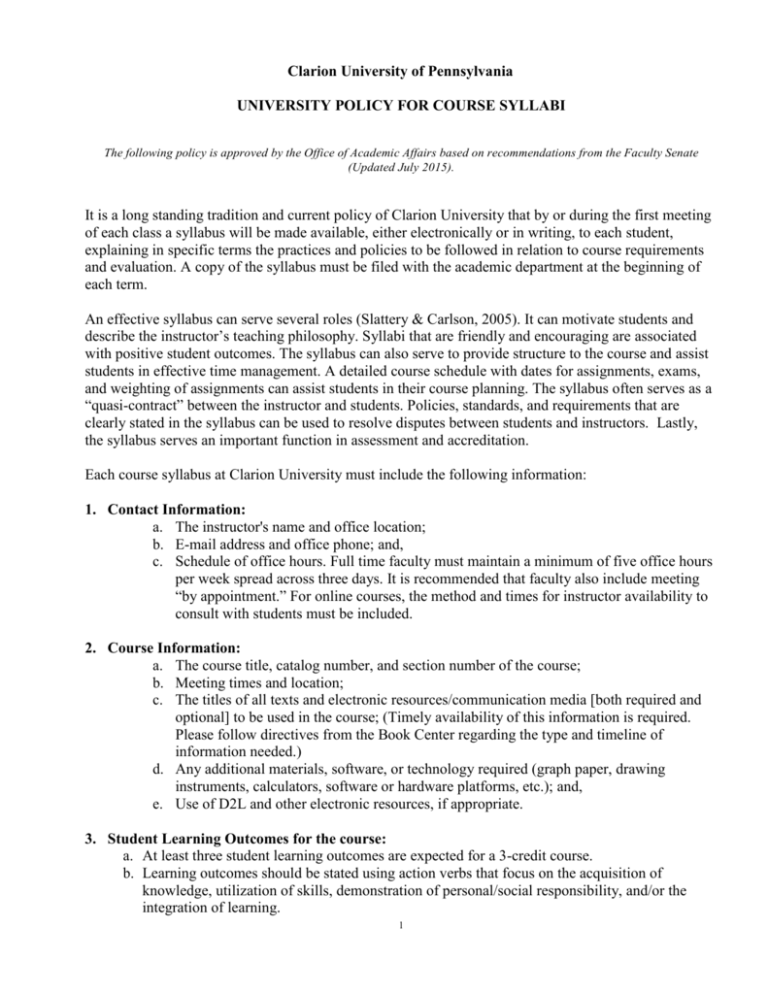
Clarion University of Pennsylvania UNIVERSITY POLICY FOR COURSE SYLLABI The following policy is approved by the Office of Academic Affairs based on recommendations from the Faculty Senate (Updated July 2015). It is a long standing tradition and current policy of Clarion University that by or during the first meeting of each class a syllabus will be made available, either electronically or in writing, to each student, explaining in specific terms the practices and policies to be followed in relation to course requirements and evaluation. A copy of the syllabus must be filed with the academic department at the beginning of each term. An effective syllabus can serve several roles (Slattery & Carlson, 2005). It can motivate students and describe the instructor’s teaching philosophy. Syllabi that are friendly and encouraging are associated with positive student outcomes. The syllabus can also serve to provide structure to the course and assist students in effective time management. A detailed course schedule with dates for assignments, exams, and weighting of assignments can assist students in their course planning. The syllabus often serves as a “quasi-contract” between the instructor and students. Policies, standards, and requirements that are clearly stated in the syllabus can be used to resolve disputes between students and instructors. Lastly, the syllabus serves an important function in assessment and accreditation. Each course syllabus at Clarion University must include the following information: 1. Contact Information: a. The instructor's name and office location; b. E-mail address and office phone; and, c. Schedule of office hours. Full time faculty must maintain a minimum of five office hours per week spread across three days. It is recommended that faculty also include meeting “by appointment.” For online courses, the method and times for instructor availability to consult with students must be included. 2. Course Information: a. The course title, catalog number, and section number of the course; b. Meeting times and location; c. The titles of all texts and electronic resources/communication media [both required and optional] to be used in the course; (Timely availability of this information is required. Please follow directives from the Book Center regarding the type and timeline of information needed.) d. Any additional materials, software, or technology required (graph paper, drawing instruments, calculators, software or hardware platforms, etc.); and, e. Use of D2L and other electronic resources, if appropriate. 3. Student Learning Outcomes for the course: a. At least three student learning outcomes are expected for a 3-credit course. b. Learning outcomes should be stated using action verbs that focus on the acquisition of knowledge, utilization of skills, demonstration of personal/social responsibility, and/or the integration of learning. 1 a. The method(s) of assessing achievement of the learning outcomes must also be included for each learning outcome. As an example, a learning outcome and assessment might be stated, “Students will be able to write effective reports in the style and format consistent with the discipline. This outcome will be assessed through the draft and final written reports required in the course.” b. Advice and suggestions regarding the writing learning outcomes and linking them with assessment techniques can be found at http://www.clarion.edu/facultystaff/important-faculty-policies-andlinks/Writing%20Effective%20Student%20Learning%20Outcomes%20and%20Samp le%20Syllabi.pdf 4. Course requirements a. A list of readings, a description of course assignments, and tentative dates for major assignments and tests. b. Any additional special materials students must purchase c. A course attendance policy must be clearly stated. For online courses, policies on student participation must be clearly stated. The policy should include language regarding how attendance or lack of attendance or participation may directly impact the student’s grade. The policy may also refer students to the University policy found at http://www.clarion.edu/academics/registrars-office/academic-policies/index.html d. Classes must meet during their scheduled final examination time slot. Please note that by university policy each course will have a final examination, given during the scheduled final examination period. 5. Grading information that must be included: a. A description and listing of the grading components and the relative contributions of assignments/activities/attendance to the final grade. [See http://www.clarion.edu/academics/registrars-office/for-students/frequently-askedquestions.html#socialsecuritynumber for information on the policy for posting of grades.] i. The contribution of each quiz, midterm, and final examination to the grade ii. The contribution of term papers, outside readings, etc., to the grade iii. The contribution of hand in work or homework iv. The contribution of class participation and the kind of participation expected b. A description of the method for calculating final grades. c. Information about make-up and late assignments, if appropriate. 6. Other University Policy Information a. The following statement relative to Title IX is required by PASSHE: “Clarion University and its faculty are committed to assuring a safe and productive educational environment for all students. In order to meet this commitment and to comply with Title IX of the Education Amendments of 1972 and guidance from the Office for Civil Rights, the University requires faculty members to report incidents of sexual violence shared by students to the University's Title IX Coordinator. The only exceptions to the faculty member's reporting obligation are when incidents of sexual violence are communicated by a student during a classroom discussion, in a writing assignment for a class, or as part of a University-approved research project. Faculty members are obligated to report sexual violence or any other abuse of a student who was, or is, a child (a person under 18 years of age) when the abuse allegedly occurred to the person designated in the University protection of minors policy. Information regarding the reporting of sexual violence and the resources that are available to victims of sexual violence is set forth at 2 the Office of Social Equity/Title IX webpage http://www.clarion.edu/aboutclarion/offices-and-administration/university-support-and-business/office-of-socialequity/policies-and-compliance/sexual-misconduct-definitions-and-faq.html and http://www.clarion.edu/titleix.” b. A statement on Academic Honesty and Integrity and your policy on dealing with violations of academic honesty. Academic honesty: http://www.clarion.edu/studentlife/student-affairs/conduct-policies-and-judicial-services/academic-integritypolicy.html) c. If you use TurnItIn, this notice must be placed in your syllabus: i. “Clarion University has a license agreement with Turnitin.com, a service that helps prevent plagiarism by comparing student papers with Turnitin's database and Internet sources. Students who take this course agree that all required papers may be submitted to Turnitin.com. While student privacy is protected, papers submitted to Turnitin do become source documents in Turnitin's reference database solely for the purpose of detecting plagiarism of such papers. Use of the Turnitin service is subject to the Terms and Conditions of Use posted on Turnitin's website. Clarion University is committed to preserving academic integrity as defined by the Academic Honesty Policy (http://www.clarion.edu/student-life/student-affairs/conduct-policies-andjudicial-services/academic-integrity-policy.html).” d. A statement about accommodations for students with disabilities. Suggested wording for this is: i. “If you are a student with a documented disability and require accommodations, you must register with the University's Office of Disability Support Services (DSS) and provide current documentation to DSS which identifies the disability and need for accommodation(s). Students must meet with DSS to discuss requested accommodations. Students must provide instructors with appropriate notification from DSS of the approved accommodation as early in the semester as possible. The Office of Disability Support Services can be reached by calling (814) 393-2095 and is located in Becht Hall.” Additional information may include: Other Policies at http://www.clarion.edu/about-clarion/offices-and-administration/universitysupport-and-business/human-resources/policies.html; The appropriate catalog at http://www.clarion.edu/academics/catalog-and-classschedules/index.html Student Rights, Regulations, and Procedures Online Handbook at http://www.clarion.edu/student-life/student-affairs/conduct-policies-and-judicial-services/StudentRights-Regulations-Procedures.pdf The following approved statement to prevent cyberbaiting, “Audio or video recording of classroom meetings is not allowed without prior permission from the instructor.” Reference: Slattery, J. M. & Carlson, J. F. (2005). Preparing an effective syllabus. Current Best Practices. College Teaching, 53, 159-164. 3
